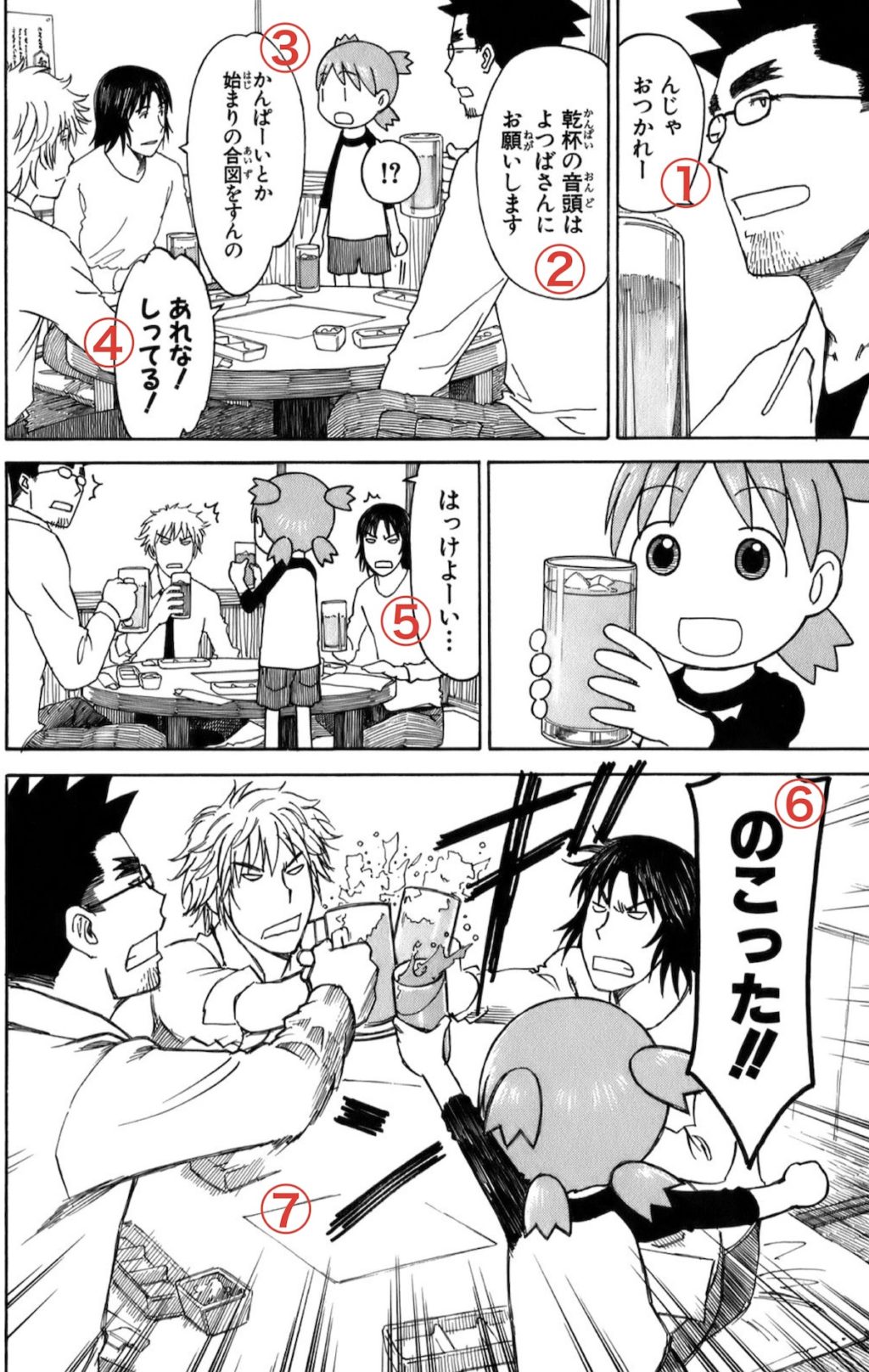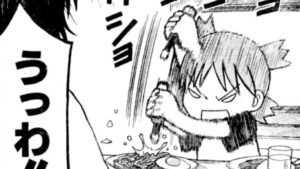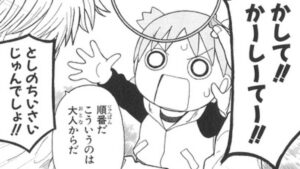Let’s learn Japanese with our analysis of manga. We will analyse a manga snippet from Yotsubato! (よつばと!) Volume 9.
CONTENTS
Manga Snippet
Sentences
Mouseover (tap on a smartphone/tablet) to reveal the censored romaji and English translation.
-
んじゃ おつかれー
nja otsukarē
Well then, good work today -
乾杯の音頭はよつばさんにお願いします
kanpai no ondo wa yotsuba-san ni onegai shimasu
We will ask Miss Yotsuba to lead us in a toast -
かんぱーいとか始まりの合図をすんの
kanpāi toka hajimari no aizu o sunno
(You say) something like “cheers” to signal us to start -
あれな!しってる!
are na! shitteru!
Oh yeah, that one! I know! -
はっけよーい…
hakkeyōi…
Ready, set… -
のこった‼︎
nokotta!!
Go!! -
ギン
gin
Cling
Analysis of Manga
-
「んじゃ おつかれー」
- んじゃ (conjunction) – then, well then
- おつかれ (interjection) – informal version of “お疲れ様”, greeting phrase used towards someone who is working or has finished work to show your appreciation for their efforts; “good work/you worked well” EXAMPLES
-
「乾杯の音頭はよつばさんにお願いします」
- 乾杯 (noun) – cheers in a drinking toast
- の (particle) – modifies a following noun
- 音頭 (noun) – lead (the act of showing a group of people what to do)
- は (particle) – indicates sentence topic
- よつば (noun) – name of the main character meaning four (よつ) leaves (ば)
- さん (suffix) – Miss, Mr., Mrs.
- に (particle) – indicates direction; to, towards
- お願い (noun) – favour
- します (verb) – do
※noun + にお願いする – to request someone EXAMPLES
-
「かんぱーいとか始まりの合図をすんの」
- かんぱーい (noun) – cheers in a drinking toast
- とか (particle) – something like EXAMPLES
- 始まり (noun) – beginning
- の (particle) – modifies a following noun
- 合図 (noun) – signal
- を (particle) – indicates direct object of action
- すん (verb) – do (する + の often becomes すん + の in colloquial speech)
- の (particle) – indicates the speaker’s intention to explain something/provide information EXAMPLES
-
「あれな!しってる!」
- あれ (noun) – that one
- な (particle) – used to convince someone of the statement in male speech (Yotsuba speaks like a boy) EXAMPLES
- しってる (verb) – know
-
「はっけよーい…」
- はっけよーい (interjection) – phrase shouted by a sumo referee to begin a sumo match; ready set (followed by のこった)
-
「のこった‼︎」
- のこった (interjection) – phrase shouted by a sumo referee to begin a sumo match; go (following はっけよい)
-
「ギン」
- ギン – onomatopoeia for hitting heavy thick glasses
Examples
おつかれ (greeting phrase used towards someone who is working or has finished work to show your appreciation for their efforts)
[Context] When you meet a friend after work:
おつかれー、どこ行く?
otsukarē, doko iku?
Hi (good work today), where do you want to go?
[Context] When you leave the office, you say it to the people who are still working:
お疲れ様です。お先に失礼します。
otsukare-sama desu. osaki ni shitsurei shimasu.
Bye (great work). I’m going home now (lit. I will be rude to leave before you but please excuse me).
It is a very common greeting phrase in the office or between friends who are working.
Someone + にお願いする (to request someone)
受験に合格できるよう、神様にお願いした。
juken ni gōkaku dekiru yō, kamisama ni onegai shita.
I made a wish to God that I can pass the exam.
会議の準備、山田さんにお願いしてもいいですか?
kaigi no junbi, yamada-san ni onegai shite mo ii desu ka?
Can I ask Mr. Yamada to prepare for the meeting?
〜とか (something like)
こんな暑い日は、アイスとか食べたい。
konna atsui hi wa, aisu toka tabetai.
On hot days like this, I want to eat something like ice cream.
暇なら本を読むとかしたら?
hima nara hon o yomu toka shita ra?
If you are free, why don’t you read a book or something?
〜の (indicates the speaker’s intention to explain something/provide information)
私が欲しいのはこれじゃないの!あれなの!
watashi ga hoshii no wa kore janai no! are na no!
What I want is not this one! It’s that one!
やる気がなくても、とにかくやり始めんの。それが勉強のコツだよ。
yaruki ga nakutemo, tonikaku yarihajimen no. sore ga benkyō no kotsu da yo.
Even if you are not motivated, just start doing it. That’s my study tip.
Noun + な (used to convince someone of the statement in male speech)
サッカーやろうぜ。お前、ゴールキーパーな。
sakkā yarō ze. omae, gōrukīpā na.
Let’s play soccer. You are the goalkeeper.
ここのトンカツ、おいしいよね。 – それな!
koko no tonkatsu, oishii yone. – sore na!
The pork cutlet here is delicious, isn’t it? – It truly is!
それな is a slang expression that mostly young people use, meaning “that’s true”, “that’s right”, “I agree with you”, etc.
Support Easy Peasy Japanesey
If you enjoy our content, please consider supporting Easy Peasy Japanesey. Your support will help keep us going. Thank you for your support!




do more of this!
Up, I like this one
Thanks for your comment & sorry for our late reply. We just uploaded a new Analysis of Manga – Yotsubato! #10. Hope you like it!
https://epjapanesey.com/analysis-of-manga-yotsubato-10